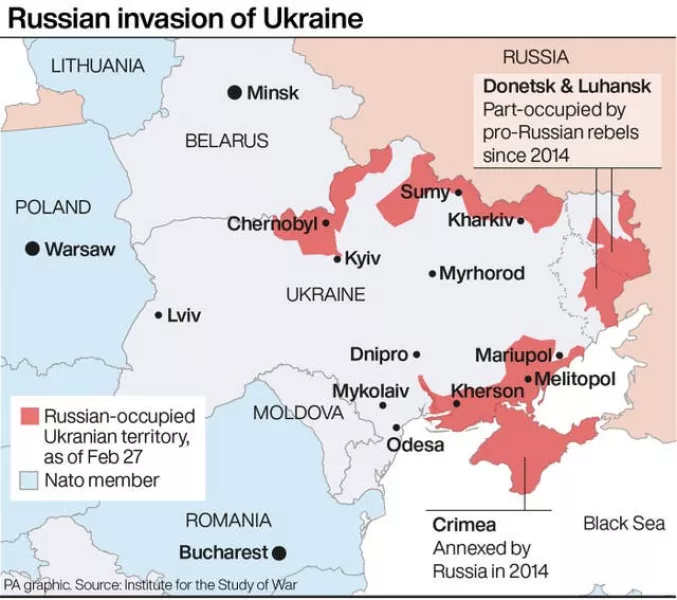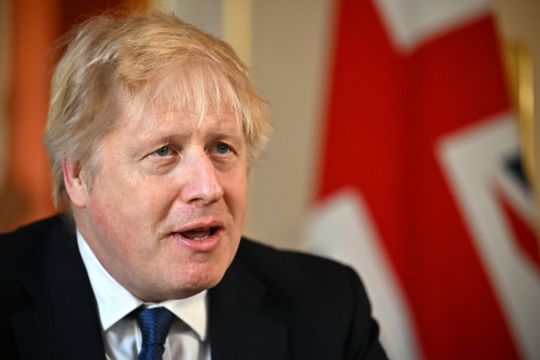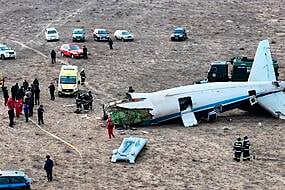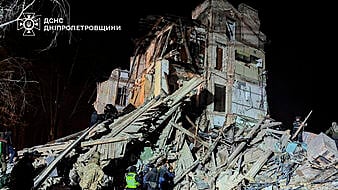Britain has announced new sanctions against Russian banks to heap pressure on Vladimir Putin over his invasion of Ukraine, as Downing Street eyed the possibility that economic pressure could bring down the Russian president’s regime.
Boris Johnson said Mr Putin had made a “colossal mistake” in invading Ukraine, and praised the country for its fierce resistance and proving Moscow wrong to think tanks would be “garlanded with roses”.
Liz Truss said all Russian banks would be hit with a full asset freeze within days as she announced new powers to limit them from clearing payments in sterling, which will initially target the nation’s largest bank, Sberbank.
The UK Foreign Secretary said the war could last “months and years” as she prepared the British public for “some economic hardship” as a result of the sanctions, but vowed to Ukraine that the UK would “suffer economic sacrifices to support you, however long it takes”.
In other developments, the UK Home Secretary Priti Patel ruled out a visa waiver for Ukrainians fleeing the conflict, citing fears that Moscow’s troops and extremists could come to the UK, as she came under pressure to help more people reach safety in Britain.
The UK Transport Secretary Grant Shapps asked all UK ports to deny access to Russian flagged, registered or operated vessels.
Ukrainian President Volodymyr Zelensky said 16 children had been killed and 45 injured during the Russian invasion.
The sanctions imposed by Britain and allies appear to be having an impact, with the rouble sinking by nearly 26 per cent against the US dollar by Monday morning.
Switzerland strayed from its history of neutrality to adopt EU sanctions against Russia, in a major step that will curtail the ability of rich Russians to store their wealth there.
G7 and other world leaders agreed to “pursue every avenue to ensure that Putin fails” during a phone call on Monday afternoon, according to No 10.
Today I've written to all UK ports asking them not to provide access to any Russian flagged, registered, owned, controlled, chartered or operated vessels.
Given Putin's action in #Ukraine I've made clear these vessels are NOT welcome here with prohibiting legislation to follow. pic.twitter.com/5pKzfvcbGi— Rt Hon Grant Shapps MP (@grantshapps) February 28, 2022
Advertisement
Mr Johnson will continue his diplomatic push on Tuesday by travelling to Poland and Estonia for meetings with his counterparts and Nato secretary-general Jens Stoltenberg.
At a Cabinet meeting on Monday, Mr Johnson and ministers received a briefing on the scale of discontent among the Russian people to the Kremlin’s attack on their neighbouring nation.
Mr Johnson said: “It is becoming clearer with each day that Putin had made a colossal mistake believing that the guns of his tanks would be garlanded with roses when instead the Ukrainian people had put up a fierce resistance in defence of their homeland.”
Downing Street said Mr Johnson discussed the latest intelligence suggesting Russia’s advance had been “hampered by logistical problems and the heroic efforts of the Ukrainian military who are inflicting significant casualties on Russian troops”.
The UK Cabinet was updated by the chairman of the Joint Intelligence Committee, Sir Simon Gass, and the Chief of the Defence staff, Admiral Sir Tony Radakin, who No 10 said discussed “the discontent among many of the Russian people including an anti-war petition that has attracted around a million signatures”.

With western sanctions biting, the Russian central bank was forced to sharply raise its key interest rate to save the rouble from collapse.
No 10 said Mr Johnson told Cabinet that Mr Putin had “underestimated western unity and the strength of the sanctions his action could lead to”.
The Prime Minister’s official spokesman said Britain does not want to “unnecessarily inflict damage on the Russian people” but added that western sanctions “are to bring down the Putin regime” and “anyone who is actively seeking to support any elements of the Putin regime should think very carefully”.
No 10 later said the Prime Minister’s official spokesman had “misspoke” when he said western sanctions are designed to bring about regime change, but the slip-up portrayed how some think the economic pain inflicted could have wide-reaching ramifications.
Ms Truss vowed that “Putin must lose” as she went on to announce the new legislation in the Commons, saying state-owned Sberbank would be hit with the sterling ban as soon as the powers come into force.

“With over 50 per cent of Russian trade denominated in dollars or sterling, our co-ordinated action with the United States will damage Russia’s ability to trade with the world,” she said.
The Foreign Secretary also announced a full asset freeze on three further Russian banks – VEB, Sovcombank, Otkritie – before adding: “We will bring in a full asset freeze on all Russian banks in days, looking to co-ordinate with our allies.
“The UK and our allies will have to undergo some economic hardship as a result of our sanctions but our hardships are nothing compared to those endured by the people of Ukraine.”
The Treasury targeted Russia’s central bank with sanctions in a response co-ordinated with US and European allies.
Despite the continued assault, Ukraine agreed to talks with Moscow and sent a delegation to the border with Belarus for the meeting.
But British officials were not holding out much hope for the peace talks, and fear Moscow could use more indiscriminate force if the invasion stalls.
Western officials believe that so far around half of the Russian forces that had been ringed around Ukraine’s borders have been committed to the assault.
One official said Mr Putin had underestimated Ukrainian resistance, both militarily and among the general population, and had “stirred up a hornet’s nest” as a result.







